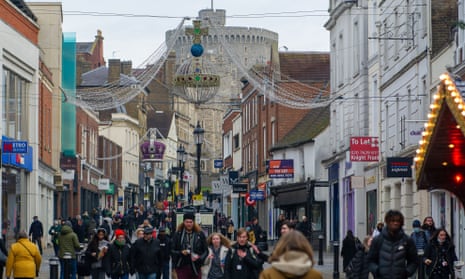The UK economy surpassed its pre-pandemic level for the first time in November ahead of the rapid spread of the Omicron variant and the government’s warnings about workplace and social gatherings.
Official figures showed GDP grew by 0.9% in the penultimate month of 2021, making the UK economy 0.7% larger than it was before March 2020 and the first lockdown.
The US, France, Denmark and Sweden are among the other rich countries to have recovered all the lost ground during the pandemic while Germany, Italy and Spain have yet to pass the pandemic milestone.
City economists had expected an expansion of only 0.4% and said November was likely to prove a high point in 2021, with the figures collected by the Office for National Statistics coming shortly before the Omicron variant took hold, exacerbating worker shortages as thousands were off sick. It followed growth of 0.2% in October.
A surge in early Christmas shopping provided one of the biggest boosts to activity in November, though all sectors, including manufacturing and services, reported expanding output.
With the HS2 high-speed rail line starting to make some headway and housebuilding able to benefit from a mild November, the construction industry increased by 3.5%, reversing a trend of contraction dating back to May.
The continuing increase in health services as a proportion of economic activity was another factor supporting the rise in GDP, the ONS said.
Against a backdrop of rising inflation and the expectation of further interest rate rises by the Bank of England, business groups warned the economy remained weak.
Suren Thiru, the head of economics at the British Chambers of Commerce, said: “Stronger growth in November is likely to be followed by a modest fall in output in December and January, as consumer caution to socialise and spend, and mounting staff absences sparked by Omicron and plan B limit activity.
“While the UK economy should rebound once plan B measures are lifted, surging inflation and persistent supply chain disruption may mean that the UK’s economic growth prospects remain under pressure for much of 2022.”
Analysts said that while the economy had struggled to grow since the summer, there was the prospect of a return to stronger growth in 2022, albeit with consumer spending constrained by the rising cost of living.
ONS officials said there was little evidence from early indicators that many shops and restaurants were forced close in December, though business lobby groups suffered a collapse in bookings that prompted the chancellor, Rishi Sunak, to offer £1bn in extra support.
Ana Boata, the head of economic research at the credit insurer Euler Hermes, said the consumer had come to the rescue of an economy still suffering the effects of Covid-19
“We expect GDP growth to hit 4.4% this year, followed by a further 2.6% increase in 2023. It’s not all plain sailing, though. Wages will go up about 3.5% above the pre-crisis average in 2022, in reaction to price rises across the full economy.
“Despite the Bank of England expected to raise rates at least twice this year to keep inflation in check, households’ real purchasing power will suffer, leaving excess savings to prop up consumer spending levels.”
Sunak welcomed the news that Britain’s economy was larger than before the pandemic.
“It’s amazing to see the size of the economy back to pre-pandemic levels in November – a testament to the grit and determination of the British people,” he said.










